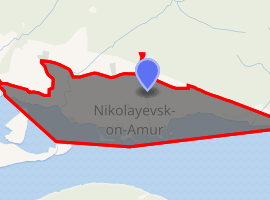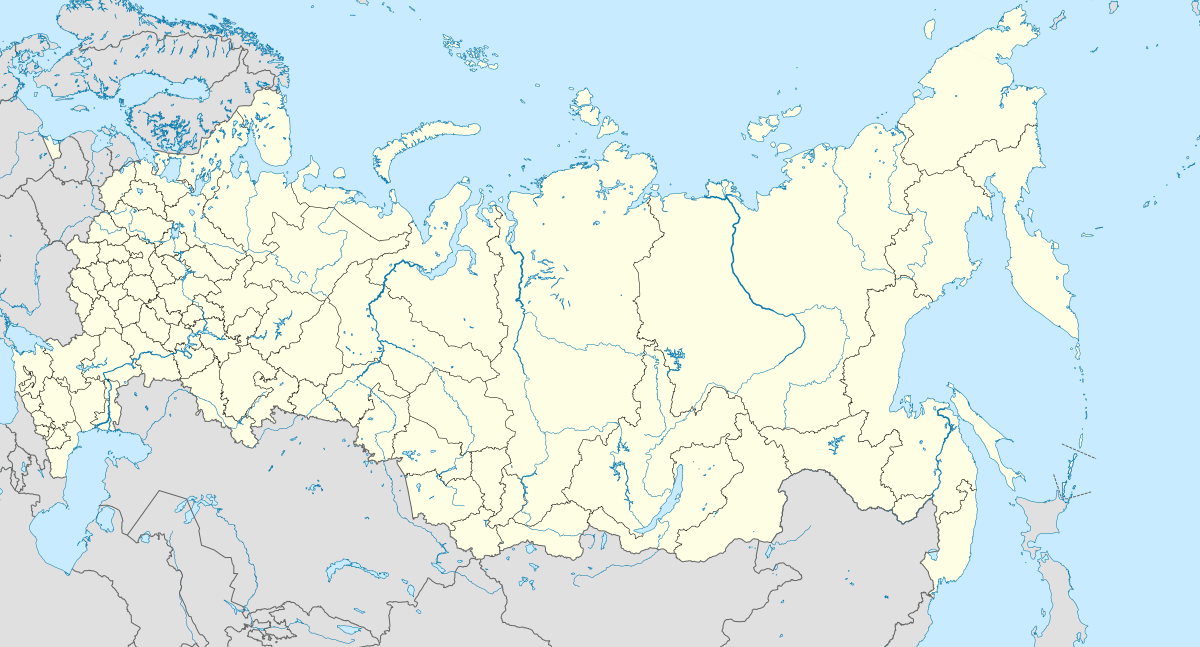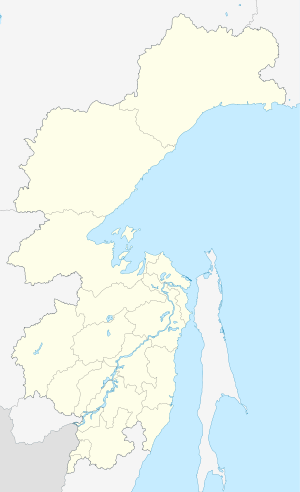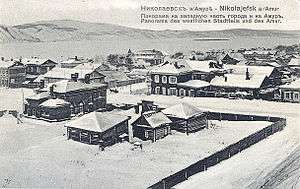Nikolayevsk-on-Amur
Nikolayevsk-on-Amur (Russian: Никола́евск-на-Аму́ре, Nikolayevsk-na-Amure) is a town in Khabarovsk Krai, Russia located on the Amur River close to its liman in the Pacific Ocean. Population: 22,752 (2010 Census);[2] 28,492 (2002 Census);[9] 36,296 (1989 Census).[10]
Nikolayevsk-on-Amur Николаевск-на-Амуре | |
|---|---|
Town[1] | |
_new.png) Flag _(2002).png) Coat of arms | |
Location of Nikolayevsk-on-Amur 
| |
 Nikolayevsk-on-Amur Location of Nikolayevsk-on-Amur  Nikolayevsk-on-Amur Nikolayevsk-on-Amur (Khabarovsk Krai) | |
| Coordinates: 53°08′N 140°44′E | |
| Country | Russia |
| Federal subject | Khabarovsk Krai[1] |
| Founded | 13 August 1850 |
| Town status since | 1856 |
| Government | |
| • Head | Pyotr Volynsky |
| Elevation | 30 m (100 ft) |
| Population | |
| • Total | 22,752 |
| • Subordinated to | town of krai significance of Nikolayevsk-on-Amur[1] |
| • Capital of | town of krai significance of Nikolayevsk-on-Amur[3], Nikolayevsky District[4] |
| • Municipal district | Nikolayevsky Municipal District[5] |
| • Urban settlement | Nikolayevsk-na-Amure Urban Settlement[5] |
| • Capital of | Nikolayevsky Municipal District[6], Nikolayevsk-na-Amure Urban Settlement |
| Time zone | UTC+10 (MSK+7 |
| Postal code(s)[8] | 682460 |
| Dialing code(s) | +7 42135 |
| OKTMO ID | 08631101001 |
Geography
The town is situated on the left bank of the Amur River, 80 kilometers (50 mi) from where it flows into the Amur estuary, 977 kilometers (607 mi) north of Khabarovsk and 582 kilometers (362 mi) from the Komsomolsk-on-Amur railway station. It is the closest significant settlement to the Strait of Tartary separating the mainland from Sakhalin.
History
Medieval and early-modern history
In the late Middle Ages, the people living along the lower course of the Amur (Nivkh, Oroch, Evenki) were collectively known in China as the "wild Jurchen". The Yuan Dynasty Mongols sent expeditions to this area with an eye toward using the region as a base for attack on Japan, or for defending against the Sakhalin Ainus. According to the History of Yuan, in 1264 the Nivkhs recognized the Mongol sovereignty. In 1263, the Mongols set up the "Command Post of the Marshal of the Eastern Campaign" near the modern settlement of Tyr, some 100 kilometers (62 mi) upstream from today's Nikolayevsk-on-Amur. At roughly the same time, a shrine was built on the Tyr Rock.[11][12]
From 1411 to 1433, the Ming eunuch Yishiha, a man of Haixi Jurchen origin, led four large missions to win over the allegiance of the "Jurchen" tribes along the Sunggari and Amur Rivers. During this time, the Yongning Temple was constructed at Tyr, and stelae with inscriptions erected.[11]
Russian period

The Russian settlement, likely preceded by the Manchu village of Fuyori,[13] was founded as Nikolayevsky Post by Gennady Nevelskoy on 13 August 1850 and named for Tsar Nicholas I.[14]
The settlement quickly became one of the main economic centres on the Pacific coast of the Russian Empire. It became Russia's main Pacific harbour (replacing Petropavlovsk) in 1855 after the Siege of Petropavlovsk of 1854. It was granted town status and renamed Nikolayevsk-on-Amur in 1856, when Primorskaya Oblast was established. Admiral Vasily Zavoyko supervised the construction of a naval base in Nikolayevsk-on-Amur.
The town emerged as an important commercial harbour; however, due to navigational difficulties caused by the sandbanks in the Amur estuary and because sea ice made the harbour unusable for five months each year, the main Russian shipping activities in the Pacific transferred to the better situated Vladivostok in the early 1870s. The town remained the administrative centre of this region until 1880, when the governor relocated to Khabarovsk. Anton Chekhov, visiting the town on his journey to Sakhalin in 1890, noted its rapid depopulation, although this trend slowed somewhat in the late 1890s with the discovery of gold and the establishment of salmon fisheries.
During the Russian Civil War of 1917-1922 the town's population plummeted from 15,000 to 2,000, as a local partisan leader, later executed by the same Bolsheviks he was supposed to be aligned with, razed the entire town to the ground and massacred the minority Japanese population along with most of the Russian population.
Around 1940 a prison camp of the gulag system was located in the town.[15]
Like many other places in the Russian Far East, the town has seen a drop in population since the dissolution of the Soviet Union, dropping from 36,296 inhabitants recorded in the (1989 Census),[10] to only 22,772 in 2010.[2]
Administrative and municipal status
Within the framework of administrative divisions, Nikolayevsk-on-Amur serves as the administrative center of Nikolayevsky District,[3] even though it is not a part of it.[1] As an administrative division, it is incorporated separately as the town of krai significance of Nikolayevsk-na-Amure—an administrative unit with the status equal to that of the districts.[1] As a municipal division, the town of krai significance of Nikolayevsk-na-Amure is incorporated within Nikolayevsky Municipal District as Nikolayevsk-na-Amure Urban Settlement.[5]
Economy
Fishing and fish processing are the main industries of the town, along with ship maintenance and some agricultural production in the surrounding area.
Transportation
Nikolayevsk-on-Amur has no land transport connections. Traffic to and from the town enters via the port on the Amur, or the small airport, namely Nikolayevsk-on-Amur Airport (IATA: NLI), which is home to Nikolaevsk-Na-Amure Air Enterprise.
Climate
Nikolayevsk-on-Amur has a borderline humid continental climate (Köppen Dfb), almost cold enough to be a subarctic climate (Dfc). Precipitation is not as low in the winter as over most of Siberia since the coast in on the fringe of influence from the Aleutian Low. The near-maritime location only marginally—by 5 °C (9.0 °F)—moderates the winters compared to interior Siberia, but makes the summers noticeably cool (especially in May and June) though the Oyashio fogs are less prevalent than on Sakhalin itself and sunshine hours therefore rather longer.
| Climate data for Nikolayevsk-on-Amur (1981–2010, extremes 1881–present) | |||||||||||||
|---|---|---|---|---|---|---|---|---|---|---|---|---|---|
| Month | Jan | Feb | Mar | Apr | May | Jun | Jul | Aug | Sep | Oct | Nov | Dec | Year |
| Record high °C (°F) | 0.3 (32.5) |
5.7 (42.3) |
11.9 (53.4) |
19.6 (67.3) |
31.7 (89.1) |
34.3 (93.7) |
34.1 (93.4) |
35.3 (95.5) |
28.9 (84.0) |
22.5 (72.5) |
11.4 (52.5) |
2.8 (37.0) |
35.3 (95.5) |
| Average high °C (°F) | −17.5 (0.5) |
−13.7 (7.3) |
−5.6 (21.9) |
2.9 (37.2) |
10.5 (50.9) |
19.0 (66.2) |
21.7 (71.1) |
21.5 (70.7) |
16.2 (61.2) |
6.6 (43.9) |
−6.1 (21.0) |
−15.5 (4.1) |
3.3 (37.9) |
| Daily mean °C (°F) | −21.8 (−7.2) |
−19.0 (−2.2) |
−11.6 (11.1) |
−2.1 (28.2) |
5.0 (41.0) |
13.1 (55.6) |
16.5 (61.7) |
16.1 (61.0) |
10.6 (51.1) |
2.0 (35.6) |
−10.3 (13.5) |
−19.4 (−2.9) |
−1.7 (28.9) |
| Average low °C (°F) | −25.6 (−14.1) |
−23.4 (−10.1) |
−16.9 (1.6) |
−6.4 (20.5) |
0.9 (33.6) |
8.0 (46.4) |
12.2 (54.0) |
11.8 (53.2) |
6.3 (43.3) |
−1.6 (29.1) |
−14.0 (6.8) |
−22.9 (−9.2) |
−6.0 (21.2) |
| Record low °C (°F) | −47.2 (−53.0) |
−45.9 (−50.6) |
−37.6 (−35.7) |
−28.8 (−19.8) |
−11.9 (10.6) |
−3.8 (25.2) |
1.3 (34.3) |
0.6 (33.1) |
−6.0 (21.2) |
−25.1 (−13.2) |
−34.0 (−29.2) |
−44.2 (−47.6) |
−47.2 (−53.0) |
| Average precipitation mm (inches) | 42 (1.7) |
29 (1.1) |
33 (1.3) |
32 (1.3) |
53 (2.1) |
50 (2.0) |
60 (2.4) |
83 (3.3) |
82 (3.2) |
89 (3.5) |
60 (2.4) |
48 (1.9) |
660 (26.0) |
| Average rainy days | 0 | 0 | 0.5 | 5 | 15 | 14 | 15 | 18 | 19 | 15 | 2 | 0 | 104 |
| Average snowy days | 17 | 17 | 18 | 16 | 9 | 0.1 | 0 | 0 | 0 | 12 | 21 | 19 | 129 |
| Average relative humidity (%) | 76 | 76 | 74 | 76 | 77 | 77 | 81 | 83 | 82 | 79 | 79 | 79 | 79 |
| Mean monthly sunshine hours | 129 | 160 | 232 | 209 | 233 | 234 | 238 | 204 | 184 | 143 | 132 | 94 | 2,192 |
| Source 1: pogoda.ru.net[16] | |||||||||||||
| Source 2: NOAA (sun 1961–1990)[17] | |||||||||||||
Gallery
 Administration of the Seaport
Administration of the Seaport Air port 2015g built
Air port 2015g built Airport 2015g built
Airport 2015g built The mass grave of 3 officers of the 16th Army who died in the line of duty, with a tombstone
The mass grave of 3 officers of the 16th Army who died in the line of duty, with a tombstone View from the square
View from the square City square
City square Mail building 1905g built
Mail building 1905g built Stone Temple
Stone Temple Cinema Modern is now a museum named after V.E.Rozov
Cinema Modern is now a museum named after V.E.Rozov Cinema Rodina
Cinema Rodina The Seamen's Club is now a grocery store.
The Seamen's Club is now a grocery store. Nikolayevsk-on-Amur Mayak
Nikolayevsk-on-Amur Mayak Nikolaevsk-on-Amur view from the ski resort
Nikolaevsk-on-Amur view from the ski resort Nikolaevsk-on-Amur night view of Lunacharskogo street
Nikolaevsk-on-Amur night view of Lunacharskogo street Monument of GI Nevelsky on the waterfront
Monument of GI Nevelsky on the waterfront Monument of the 7th crew of the Maritime College
Monument of the 7th crew of the Maritime College Monument to a non-stop flight
Monument to a non-stop flight
References
Notes
- Resolution #143-pr, Article 3
- Russian Federal State Statistics Service (2011). "Всероссийская перепись населения 2010 года. Том 1" [2010 All-Russian Population Census, vol. 1]. Всероссийская перепись населения 2010 года [2010 All-Russia Population Census] (in Russian). Federal State Statistics Service.
- Государственный комитет Российской Федерации по статистике. Комитет Российской Федерации по стандартизации, метрологии и сертификации. №ОК 019-95 1 января 1997 г. «Общероссийский классификатор объектов административно-территориального деления. Код 08 414», в ред. изменения №278/2015 от 1 января 2016 г.. (State Statistics Committee of the Russian Federation. Committee of the Russian Federation on Standardization, Metrology, and Certification. #OK 019-95 January 1, 1997 Russian Classification of Objects of Administrative Division (OKATO). Code 08 414, as amended by the Amendment #278/2015 of January 1, 2016. ).
- Государственный комитет Российской Федерации по статистике. Комитет Российской Федерации по стандартизации, метрологии и сертификации. №ОК 019-95 1 января 1997 г. «Общероссийский классификатор объектов административно-территориального деления. Код 08 231», в ред. изменения №278/2015 от 1 января 2016 г.. (State Statistics Committee of the Russian Federation. Committee of the Russian Federation on Standardization, Metrology, and Certification. #OK 019-95 January 1, 1997 Russian Classification of Objects of Administrative Division (OKATO). Code 08 231, as amended by the Amendment #278/2015 of January 1, 2016. ).
- Law #191
- Law #264
- "Об исчислении времени". Официальный интернет-портал правовой информации (in Russian). June 3, 2011. Retrieved January 19, 2019.
- Почта России. Информационно-вычислительный центр ОАСУ РПО. (Russian Post). Поиск объектов почтовой связи (Postal Objects Search) (in Russian)
- Russian Federal State Statistics Service (May 21, 2004). "Численность населения России, субъектов Российской Федерации в составе федеральных округов, районов, городских поселений, сельских населённых пунктов – районных центров и сельских населённых пунктов с населением 3 тысячи и более человек" [Population of Russia, Its Federal Districts, Federal Subjects, Districts, Urban Localities, Rural Localities—Administrative Centers, and Rural Localities with Population of Over 3,000] (XLS). Всероссийская перепись населения 2002 года [All-Russia Population Census of 2002] (in Russian).
- "Всесоюзная перепись населения 1989 г. Численность наличного населения союзных и автономных республик, автономных областей и округов, краёв, областей, районов, городских поселений и сёл-райцентров" [All Union Population Census of 1989: Present Population of Union and Autonomous Republics, Autonomous Oblasts and Okrugs, Krais, Oblasts, Districts, Urban Settlements, and Villages Serving as District Administrative Centers]. Всесоюзная перепись населения 1989 года [All-Union Population Census of 1989] (in Russian). Институт демографии Национального исследовательского университета: Высшая школа экономики [Institute of Demography at the National Research University: Higher School of Economics]. 1989 – via Demoscope Weekly.
- В. Ц. Головачёв (V. Ts. Golovachеv), "Тырские стелы и храм «Юн Нин» в свете китайско-чжурчжэньских отношений XIV-XV вв." Archived February 23, 2009, at the Wayback Machine (ййThe Tyr stelae and the Yongning Temple viewed in as an aspect of Sino-Jurchen relationsйй), Etno-zhurnal, November 14, 2008.
- Объекты туризма — Археологические. Тырские храмы Archived September 3, 2009, at the Wayback Machine (Regional government site explaining the location of the Tyr (Telin) temples: just south of the Tyr village)
-
Mote, Victor L. (1998). Siberia: Worlds Apart. Westview series on the post-Soviet republics. 5. Westview Press. p. 46. ISBN 9780813312989. Retrieved June 20, 2015.
When they unfurled a Russian flag at the mouth of the Amur and christened the site Nikolayevsk in the tsar's honor, Nevel'skoy and Murav'yev aroused a storm of protest [...]
- "Nikolayevsky-ITL on the website of Memorial (German)". Archived from the original on September 27, 2007. Retrieved January 5, 2009.
- "Климат Николаевска-на-Амуре". Погода и климат. Archived from the original on December 3, 2019. Retrieved December 3, 2019.
- "Nikolaevsk-on-Amur Climate Normals 1961–1990". National Oceanic and Atmospheric Administration. Retrieved December 3, 2019.
Sources
- Правительство Хабаровского края. Постановление №143-пр от 18 июля 2007 г. «Об утверждении реестра административно-территориальных и территориальных единиц Хабаровского края», в ред. Постановления №273-пр от 28 августа 2015 г. «О внесении изменений в Постановление Правительства Хабаровского края от 18 июля 2007 г. №143-пр "Об утверждении реестра административно-территориальных и территориальных единиц Хабаровского края"». Вступил в силу 13 августа 2007 г. Опубликован: "Собрание законодательства Хабаровского края", №7(60), 12 августа 2007 г. (Government of Khabarovsk Krai. Resolution #143-pr of July 18, 2007 On the Adoption of the Registry of the Administrative-Territorial and Territorial Units of Khabarovsk Krai, as amended by the Resolution #273-pr of August 28, 2015 On Amending the Resolution #143-pr of the Government of Khabarovsk Krai of July 18, 2007 "On the Adoption of the Registry of the Administrative-Territorial and Territorial Units of Khabarovsk Krai". Effective as of August 13, 2007.).
- Законодательная Дума Хабаровского края. Закон №191 от 30 июня 2004 г. «О наделении административных центров районов статусом городского, сельского поселения и об установлении их границ», в ред. Закона №172 от 29 февраля 2012 г. «Об упразднении сельского населённого пункта посёлок Фестивальный, находящегося на территории Солнечного района Хабаровского края, и о внесении изменений в отдельные Законы Хабаровского края». Вступил в силу со дня официального опубликования. Опубликован: "Приамурские ведомости", №№126–127, 15 июля 2004 г. (Legislative Duma of Khabarovsk Krai. Law #191 of June 30, 2004 On Granting the Administrative Centers of the Districts the Status of Urban, Rural Settlements and on Establishing Their Borders, as amended by the Law #172 of February 29, 2012 On the Abolition of the Rural Locality of the Settlement of Festivalny on the Territory of Solnechny District of Khabarovsk Krai and on Amending Various Laws of Khabarovsk Krai. Effective as of the day of the official publication.).
- Законодательная Дума Хабаровского края. Закон №264 от 14 марта 2005 г «Об административных центрах сельских поселений и муниципальных районов Хабаровского края», в ред. Закона №239 от 28 ноября 2012 г. «О преобразовании городского населённого пункта рабочий посёлок Тырма, находящегося на территории Верхнебуреинского района Хабаровского края, путём изменения его статуса в сельский населённый пункт — посёлок Тырма и о внесении изменений в отдельные Законы Хабаровского края». Вступил в силу со дня официального опубликования. Опубликован: "Приамурские ведомости", №57, 1 апреля 2005 г. (Legislative Duma of Khabarovsk Krai. Law #264 of March 14, 2005 On the Administrative Centers of the Rural Settlements and the Municipal Districts of Khabarovsk Krai, as amended by the Law #239 of November 28, 2012 On the Transformation of the Urban Locality the Work Settlement of Tyrma, Located on the Territory of Verkhnebureinsky District of Khabarovsk Krai, by Changing Its Status to That of a Rural Locality—the Settlement of Tyrma, and on Amending Various Laws of Khabarovsk Krai. Effective as of the day of the official publication.).
External links
- Nikolayevsk-na-Amure at the Encyclopædia Britannica
- . Encyclopædia Britannica (11th ed.). 1911.